ACC620 Contemporary Issues in Accounting: Corporate Failure Research
VerifiedAdded on 2023/06/04
|10
|2415
|313
Project
AI Summary
This research proposal, submitted for ACC620 Contemporary Issues in Accounting, investigates the impact of corporate governance and leadership on corporate failures. The introduction establishes the economic costs of business failures and defines corporate failure as an inability to meet strategic, financial, and legal objectives. The research question focuses on the major factors influencing corporate failure. The practical motivation highlights the significance of corporate failures for various stakeholders and the increasing number of insolvency filings. The theoretical motivation emphasizes the lack of research in Australia on this topic, aiming to contribute to the existing theory of corporate failures. The literature review examines studies on corporate governance characteristics, the role of corporate governance in financial crises, stakeholder and agency theories, and the impact of leadership. The study proposes two hypotheses: corporate governance directly influences corporate failures, and organizational leadership directly impacts corporate failures. The proposal includes a comprehensive literature review with summaries of key journal articles, supporting the argument for the relationship between corporate governance, leadership, and corporate failure.
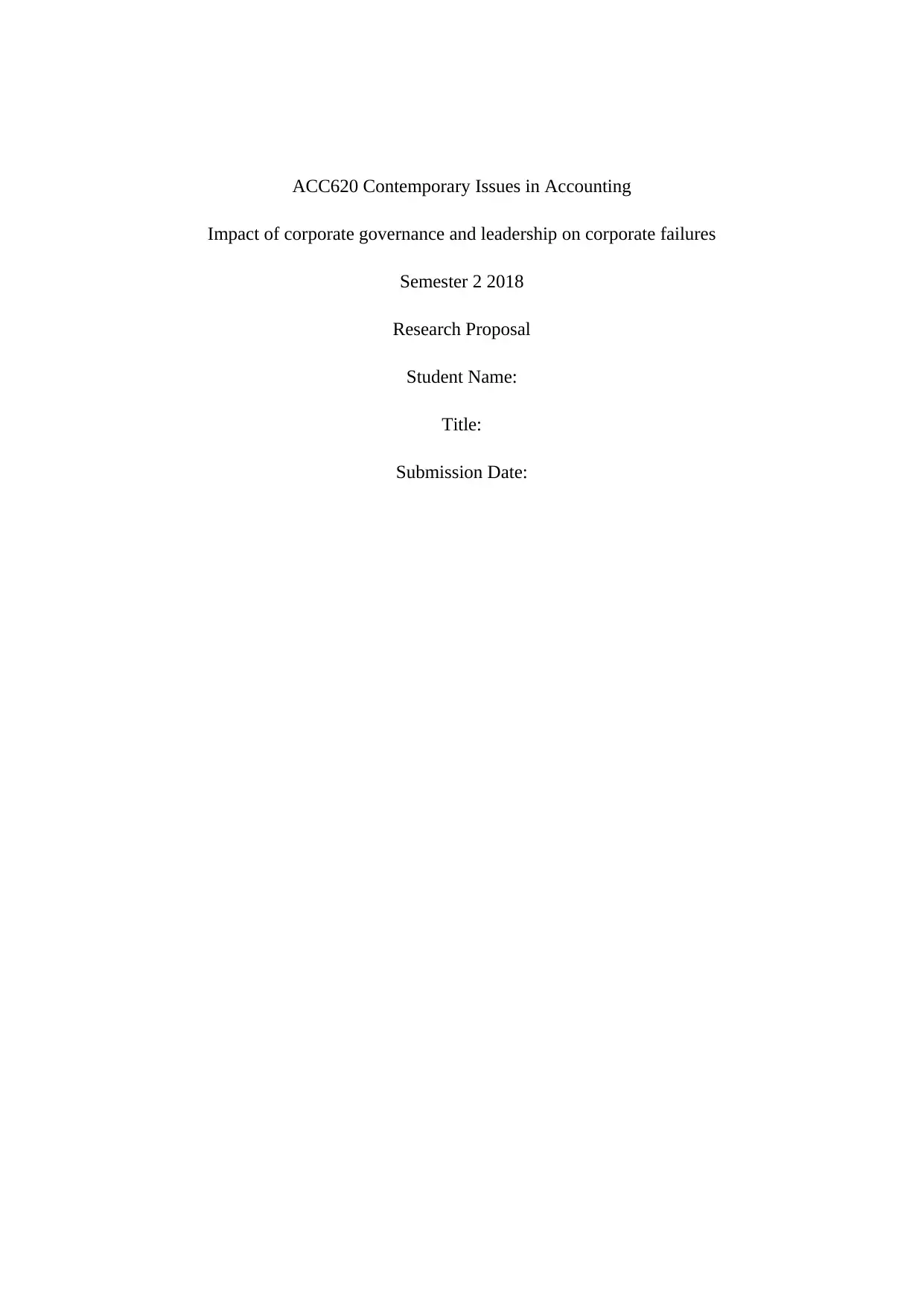
ACC620 Contemporary Issues in Accounting
Impact of corporate governance and leadership on corporate failures
Semester 2 2018
Research Proposal
Student Name:
Title:
Submission Date:
Impact of corporate governance and leadership on corporate failures
Semester 2 2018
Research Proposal
Student Name:
Title:
Submission Date:
Paraphrase This Document
Need a fresh take? Get an instant paraphrase of this document with our AI Paraphraser
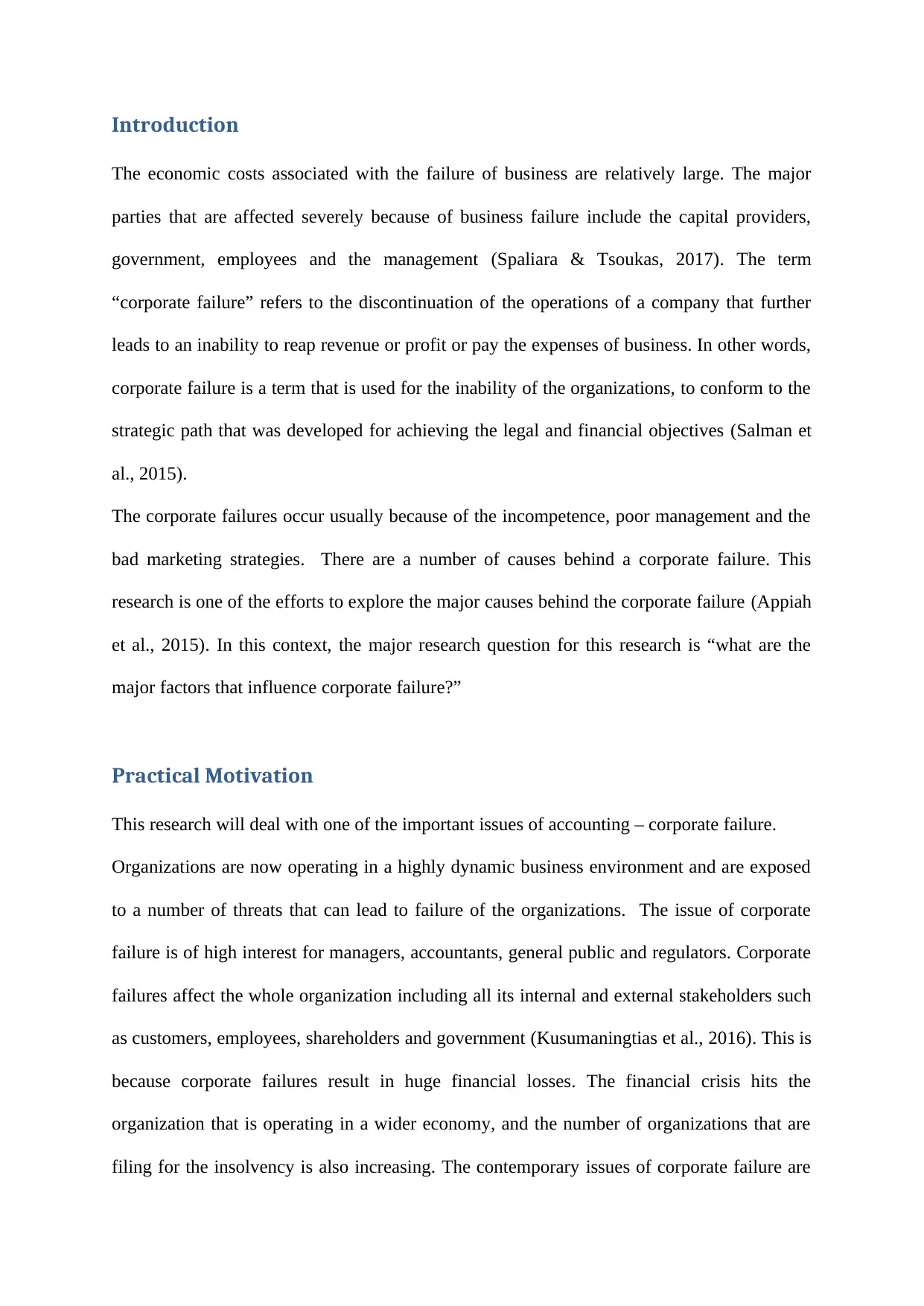
Introduction
The economic costs associated with the failure of business are relatively large. The major
parties that are affected severely because of business failure include the capital providers,
government, employees and the management (Spaliara & Tsoukas, 2017). The term
“corporate failure” refers to the discontinuation of the operations of a company that further
leads to an inability to reap revenue or profit or pay the expenses of business. In other words,
corporate failure is a term that is used for the inability of the organizations, to conform to the
strategic path that was developed for achieving the legal and financial objectives (Salman et
al., 2015).
The corporate failures occur usually because of the incompetence, poor management and the
bad marketing strategies. There are a number of causes behind a corporate failure. This
research is one of the efforts to explore the major causes behind the corporate failure (Appiah
et al., 2015). In this context, the major research question for this research is “what are the
major factors that influence corporate failure?”
Practical Motivation
This research will deal with one of the important issues of accounting – corporate failure.
Organizations are now operating in a highly dynamic business environment and are exposed
to a number of threats that can lead to failure of the organizations. The issue of corporate
failure is of high interest for managers, accountants, general public and regulators. Corporate
failures affect the whole organization including all its internal and external stakeholders such
as customers, employees, shareholders and government (Kusumaningtias et al., 2016). This is
because corporate failures result in huge financial losses. The financial crisis hits the
organization that is operating in a wider economy, and the number of organizations that are
filing for the insolvency is also increasing. The contemporary issues of corporate failure are
The economic costs associated with the failure of business are relatively large. The major
parties that are affected severely because of business failure include the capital providers,
government, employees and the management (Spaliara & Tsoukas, 2017). The term
“corporate failure” refers to the discontinuation of the operations of a company that further
leads to an inability to reap revenue or profit or pay the expenses of business. In other words,
corporate failure is a term that is used for the inability of the organizations, to conform to the
strategic path that was developed for achieving the legal and financial objectives (Salman et
al., 2015).
The corporate failures occur usually because of the incompetence, poor management and the
bad marketing strategies. There are a number of causes behind a corporate failure. This
research is one of the efforts to explore the major causes behind the corporate failure (Appiah
et al., 2015). In this context, the major research question for this research is “what are the
major factors that influence corporate failure?”
Practical Motivation
This research will deal with one of the important issues of accounting – corporate failure.
Organizations are now operating in a highly dynamic business environment and are exposed
to a number of threats that can lead to failure of the organizations. The issue of corporate
failure is of high interest for managers, accountants, general public and regulators. Corporate
failures affect the whole organization including all its internal and external stakeholders such
as customers, employees, shareholders and government (Kusumaningtias et al., 2016). This is
because corporate failures result in huge financial losses. The financial crisis hits the
organization that is operating in a wider economy, and the number of organizations that are
filing for the insolvency is also increasing. The contemporary issues of corporate failure are
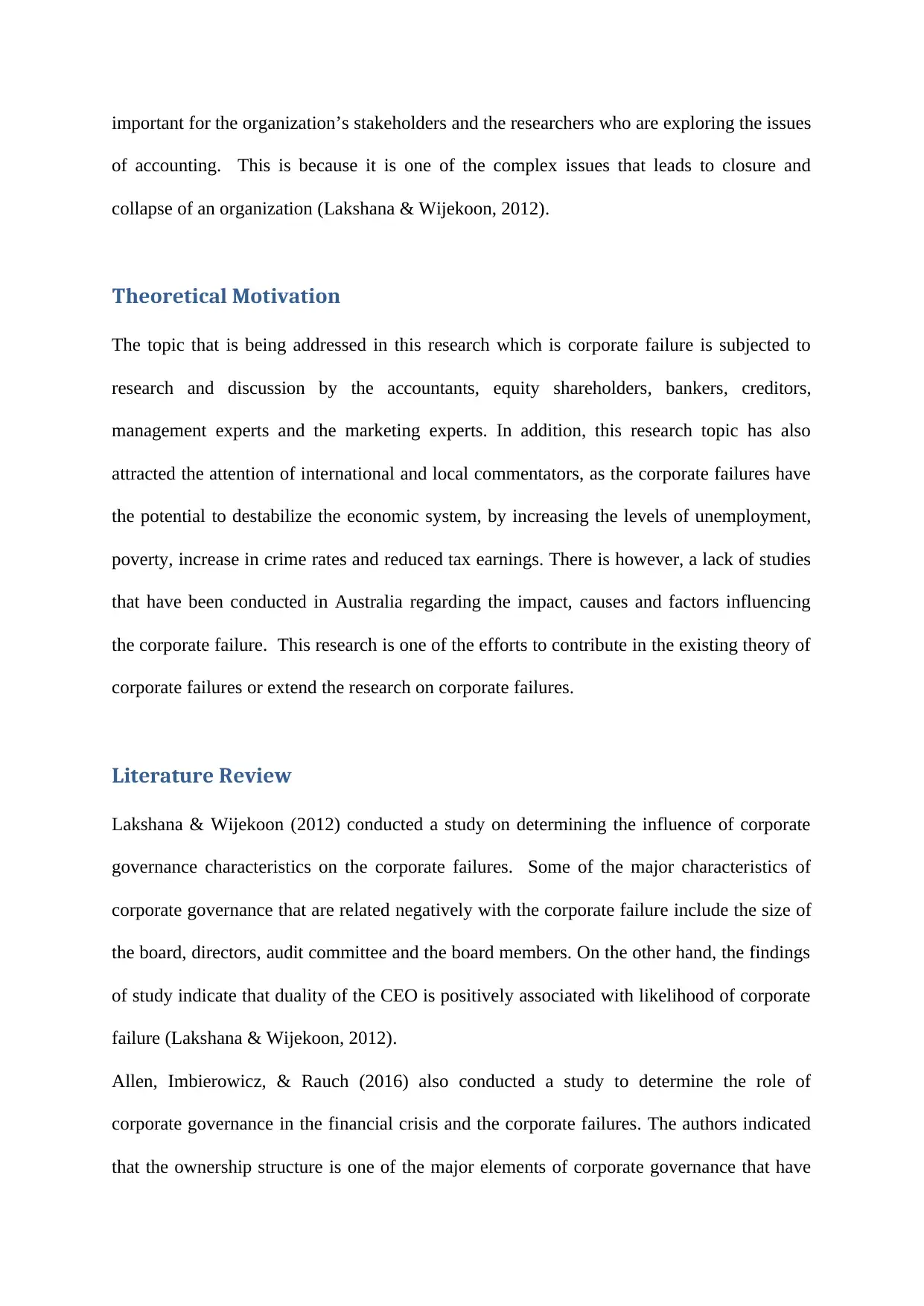
important for the organization’s stakeholders and the researchers who are exploring the issues
of accounting. This is because it is one of the complex issues that leads to closure and
collapse of an organization (Lakshana & Wijekoon, 2012).
Theoretical Motivation
The topic that is being addressed in this research which is corporate failure is subjected to
research and discussion by the accountants, equity shareholders, bankers, creditors,
management experts and the marketing experts. In addition, this research topic has also
attracted the attention of international and local commentators, as the corporate failures have
the potential to destabilize the economic system, by increasing the levels of unemployment,
poverty, increase in crime rates and reduced tax earnings. There is however, a lack of studies
that have been conducted in Australia regarding the impact, causes and factors influencing
the corporate failure. This research is one of the efforts to contribute in the existing theory of
corporate failures or extend the research on corporate failures.
Literature Review
Lakshana & Wijekoon (2012) conducted a study on determining the influence of corporate
governance characteristics on the corporate failures. Some of the major characteristics of
corporate governance that are related negatively with the corporate failure include the size of
the board, directors, audit committee and the board members. On the other hand, the findings
of study indicate that duality of the CEO is positively associated with likelihood of corporate
failure (Lakshana & Wijekoon, 2012).
Allen, Imbierowicz, & Rauch (2016) also conducted a study to determine the role of
corporate governance in the financial crisis and the corporate failures. The authors indicated
that the ownership structure is one of the major elements of corporate governance that have
of accounting. This is because it is one of the complex issues that leads to closure and
collapse of an organization (Lakshana & Wijekoon, 2012).
Theoretical Motivation
The topic that is being addressed in this research which is corporate failure is subjected to
research and discussion by the accountants, equity shareholders, bankers, creditors,
management experts and the marketing experts. In addition, this research topic has also
attracted the attention of international and local commentators, as the corporate failures have
the potential to destabilize the economic system, by increasing the levels of unemployment,
poverty, increase in crime rates and reduced tax earnings. There is however, a lack of studies
that have been conducted in Australia regarding the impact, causes and factors influencing
the corporate failure. This research is one of the efforts to contribute in the existing theory of
corporate failures or extend the research on corporate failures.
Literature Review
Lakshana & Wijekoon (2012) conducted a study on determining the influence of corporate
governance characteristics on the corporate failures. Some of the major characteristics of
corporate governance that are related negatively with the corporate failure include the size of
the board, directors, audit committee and the board members. On the other hand, the findings
of study indicate that duality of the CEO is positively associated with likelihood of corporate
failure (Lakshana & Wijekoon, 2012).
Allen, Imbierowicz, & Rauch (2016) also conducted a study to determine the role of
corporate governance in the financial crisis and the corporate failures. The authors indicated
that the ownership structure is one of the major elements of corporate governance that have
⊘ This is a preview!⊘
Do you want full access?
Subscribe today to unlock all pages.

Trusted by 1+ million students worldwide
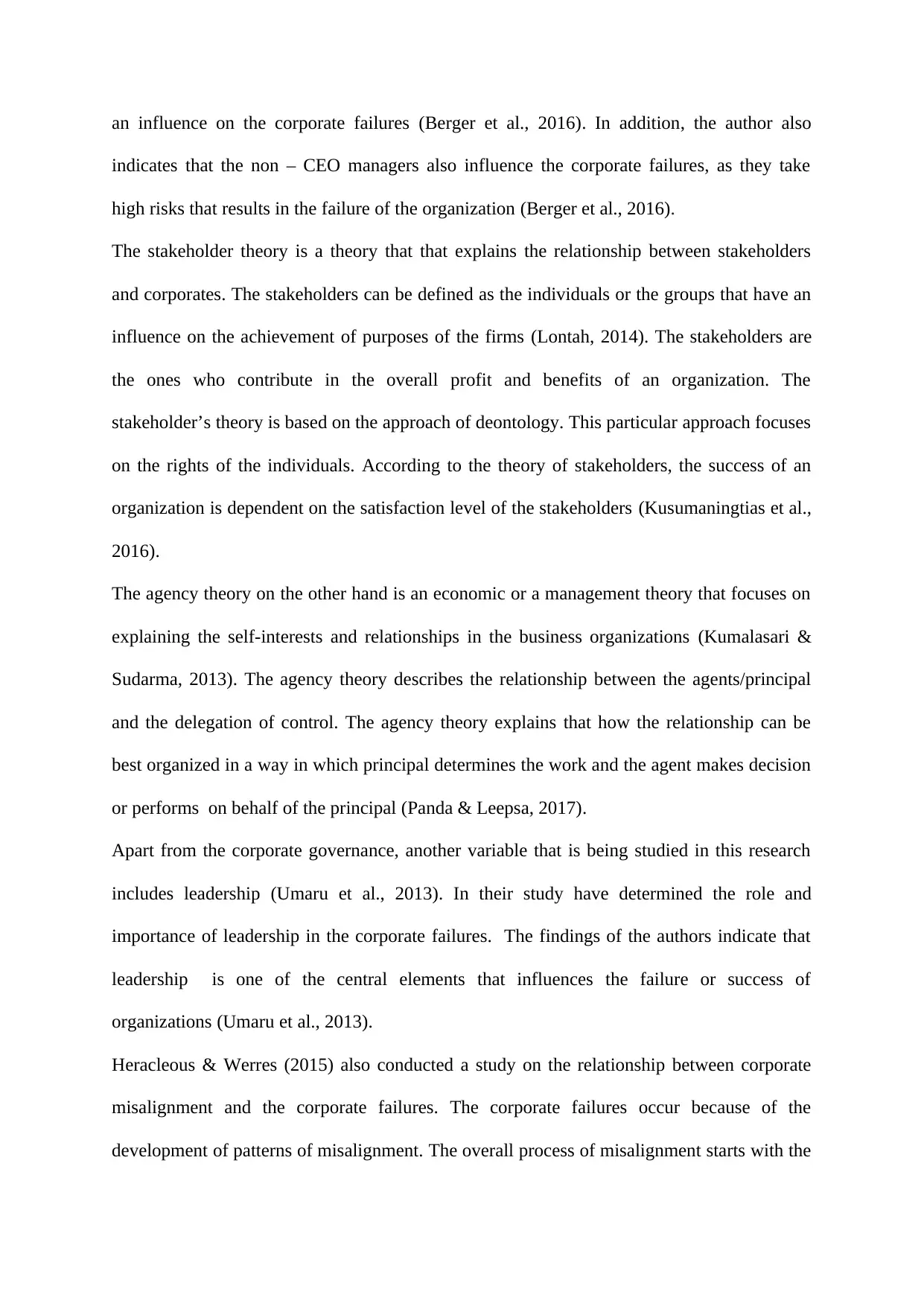
an influence on the corporate failures (Berger et al., 2016). In addition, the author also
indicates that the non – CEO managers also influence the corporate failures, as they take
high risks that results in the failure of the organization (Berger et al., 2016).
The stakeholder theory is a theory that that explains the relationship between stakeholders
and corporates. The stakeholders can be defined as the individuals or the groups that have an
influence on the achievement of purposes of the firms (Lontah, 2014). The stakeholders are
the ones who contribute in the overall profit and benefits of an organization. The
stakeholder’s theory is based on the approach of deontology. This particular approach focuses
on the rights of the individuals. According to the theory of stakeholders, the success of an
organization is dependent on the satisfaction level of the stakeholders (Kusumaningtias et al.,
2016).
The agency theory on the other hand is an economic or a management theory that focuses on
explaining the self-interests and relationships in the business organizations (Kumalasari &
Sudarma, 2013). The agency theory describes the relationship between the agents/principal
and the delegation of control. The agency theory explains that how the relationship can be
best organized in a way in which principal determines the work and the agent makes decision
or performs on behalf of the principal (Panda & Leepsa, 2017).
Apart from the corporate governance, another variable that is being studied in this research
includes leadership (Umaru et al., 2013). In their study have determined the role and
importance of leadership in the corporate failures. The findings of the authors indicate that
leadership is one of the central elements that influences the failure or success of
organizations (Umaru et al., 2013).
Heracleous & Werres (2015) also conducted a study on the relationship between corporate
misalignment and the corporate failures. The corporate failures occur because of the
development of patterns of misalignment. The overall process of misalignment starts with the
indicates that the non – CEO managers also influence the corporate failures, as they take
high risks that results in the failure of the organization (Berger et al., 2016).
The stakeholder theory is a theory that that explains the relationship between stakeholders
and corporates. The stakeholders can be defined as the individuals or the groups that have an
influence on the achievement of purposes of the firms (Lontah, 2014). The stakeholders are
the ones who contribute in the overall profit and benefits of an organization. The
stakeholder’s theory is based on the approach of deontology. This particular approach focuses
on the rights of the individuals. According to the theory of stakeholders, the success of an
organization is dependent on the satisfaction level of the stakeholders (Kusumaningtias et al.,
2016).
The agency theory on the other hand is an economic or a management theory that focuses on
explaining the self-interests and relationships in the business organizations (Kumalasari &
Sudarma, 2013). The agency theory describes the relationship between the agents/principal
and the delegation of control. The agency theory explains that how the relationship can be
best organized in a way in which principal determines the work and the agent makes decision
or performs on behalf of the principal (Panda & Leepsa, 2017).
Apart from the corporate governance, another variable that is being studied in this research
includes leadership (Umaru et al., 2013). In their study have determined the role and
importance of leadership in the corporate failures. The findings of the authors indicate that
leadership is one of the central elements that influences the failure or success of
organizations (Umaru et al., 2013).
Heracleous & Werres (2015) also conducted a study on the relationship between corporate
misalignment and the corporate failures. The corporate failures occur because of the
development of patterns of misalignment. The overall process of misalignment starts with the
Paraphrase This Document
Need a fresh take? Get an instant paraphrase of this document with our AI Paraphraser
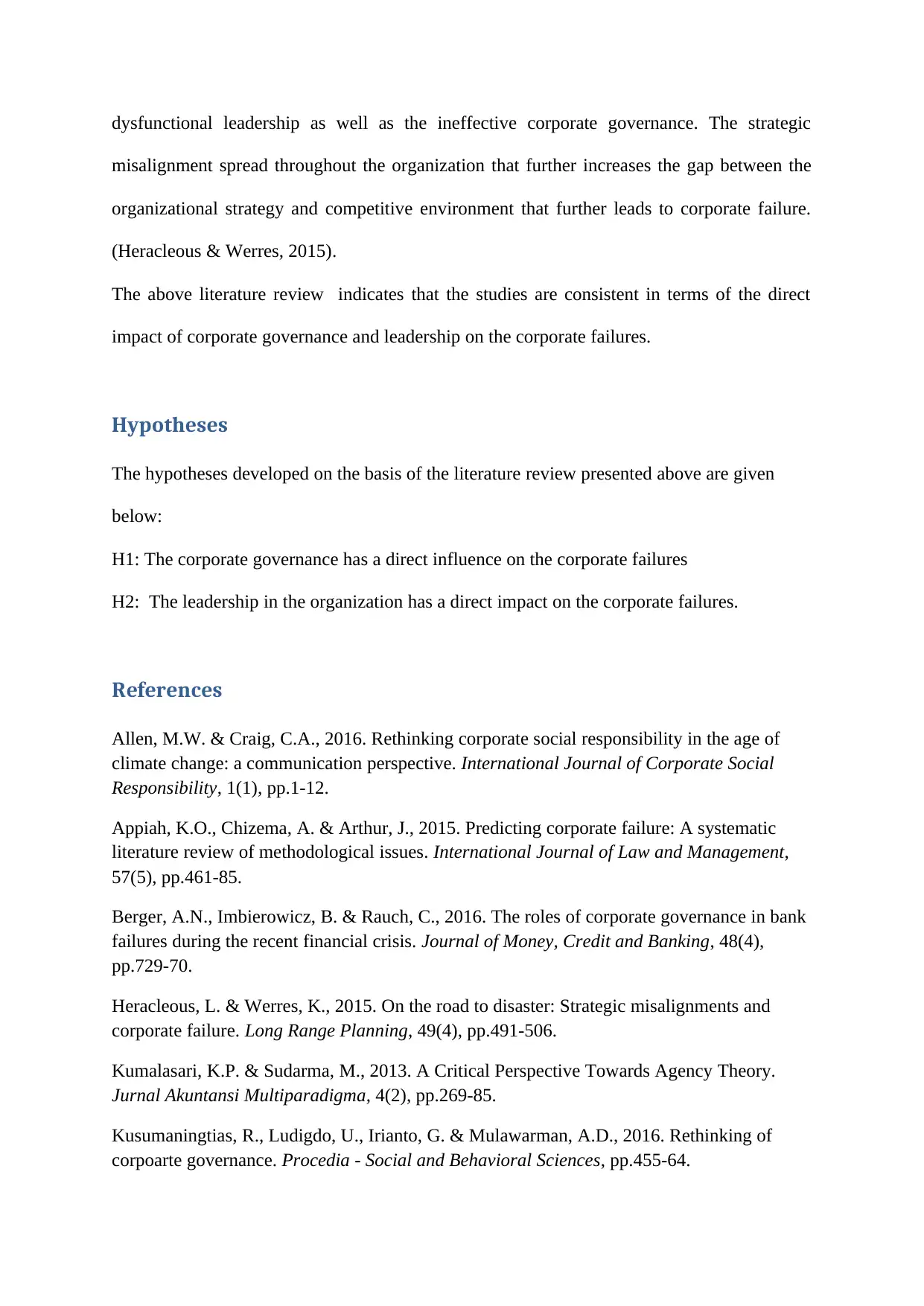
dysfunctional leadership as well as the ineffective corporate governance. The strategic
misalignment spread throughout the organization that further increases the gap between the
organizational strategy and competitive environment that further leads to corporate failure.
(Heracleous & Werres, 2015).
The above literature review indicates that the studies are consistent in terms of the direct
impact of corporate governance and leadership on the corporate failures.
Hypotheses
The hypotheses developed on the basis of the literature review presented above are given
below:
H1: The corporate governance has a direct influence on the corporate failures
H2: The leadership in the organization has a direct impact on the corporate failures.
References
Allen, M.W. & Craig, C.A., 2016. Rethinking corporate social responsibility in the age of
climate change: a communication perspective. International Journal of Corporate Social
Responsibility, 1(1), pp.1-12.
Appiah, K.O., Chizema, A. & Arthur, J., 2015. Predicting corporate failure: A systematic
literature review of methodological issues. International Journal of Law and Management,
57(5), pp.461-85.
Berger, A.N., Imbierowicz, B. & Rauch, C., 2016. The roles of corporate governance in bank
failures during the recent financial crisis. Journal of Money, Credit and Banking, 48(4),
pp.729-70.
Heracleous, L. & Werres, K., 2015. On the road to disaster: Strategic misalignments and
corporate failure. Long Range Planning, 49(4), pp.491-506.
Kumalasari, K.P. & Sudarma, M., 2013. A Critical Perspective Towards Agency Theory.
Jurnal Akuntansi Multiparadigma, 4(2), pp.269-85.
Kusumaningtias, R., Ludigdo, U., Irianto, G. & Mulawarman, A.D., 2016. Rethinking of
corpoarte governance. Procedia - Social and Behavioral Sciences, pp.455-64.
misalignment spread throughout the organization that further increases the gap between the
organizational strategy and competitive environment that further leads to corporate failure.
(Heracleous & Werres, 2015).
The above literature review indicates that the studies are consistent in terms of the direct
impact of corporate governance and leadership on the corporate failures.
Hypotheses
The hypotheses developed on the basis of the literature review presented above are given
below:
H1: The corporate governance has a direct influence on the corporate failures
H2: The leadership in the organization has a direct impact on the corporate failures.
References
Allen, M.W. & Craig, C.A., 2016. Rethinking corporate social responsibility in the age of
climate change: a communication perspective. International Journal of Corporate Social
Responsibility, 1(1), pp.1-12.
Appiah, K.O., Chizema, A. & Arthur, J., 2015. Predicting corporate failure: A systematic
literature review of methodological issues. International Journal of Law and Management,
57(5), pp.461-85.
Berger, A.N., Imbierowicz, B. & Rauch, C., 2016. The roles of corporate governance in bank
failures during the recent financial crisis. Journal of Money, Credit and Banking, 48(4),
pp.729-70.
Heracleous, L. & Werres, K., 2015. On the road to disaster: Strategic misalignments and
corporate failure. Long Range Planning, 49(4), pp.491-506.
Kumalasari, K.P. & Sudarma, M., 2013. A Critical Perspective Towards Agency Theory.
Jurnal Akuntansi Multiparadigma, 4(2), pp.269-85.
Kusumaningtias, R., Ludigdo, U., Irianto, G. & Mulawarman, A.D., 2016. Rethinking of
corpoarte governance. Procedia - Social and Behavioral Sciences, pp.455-64.
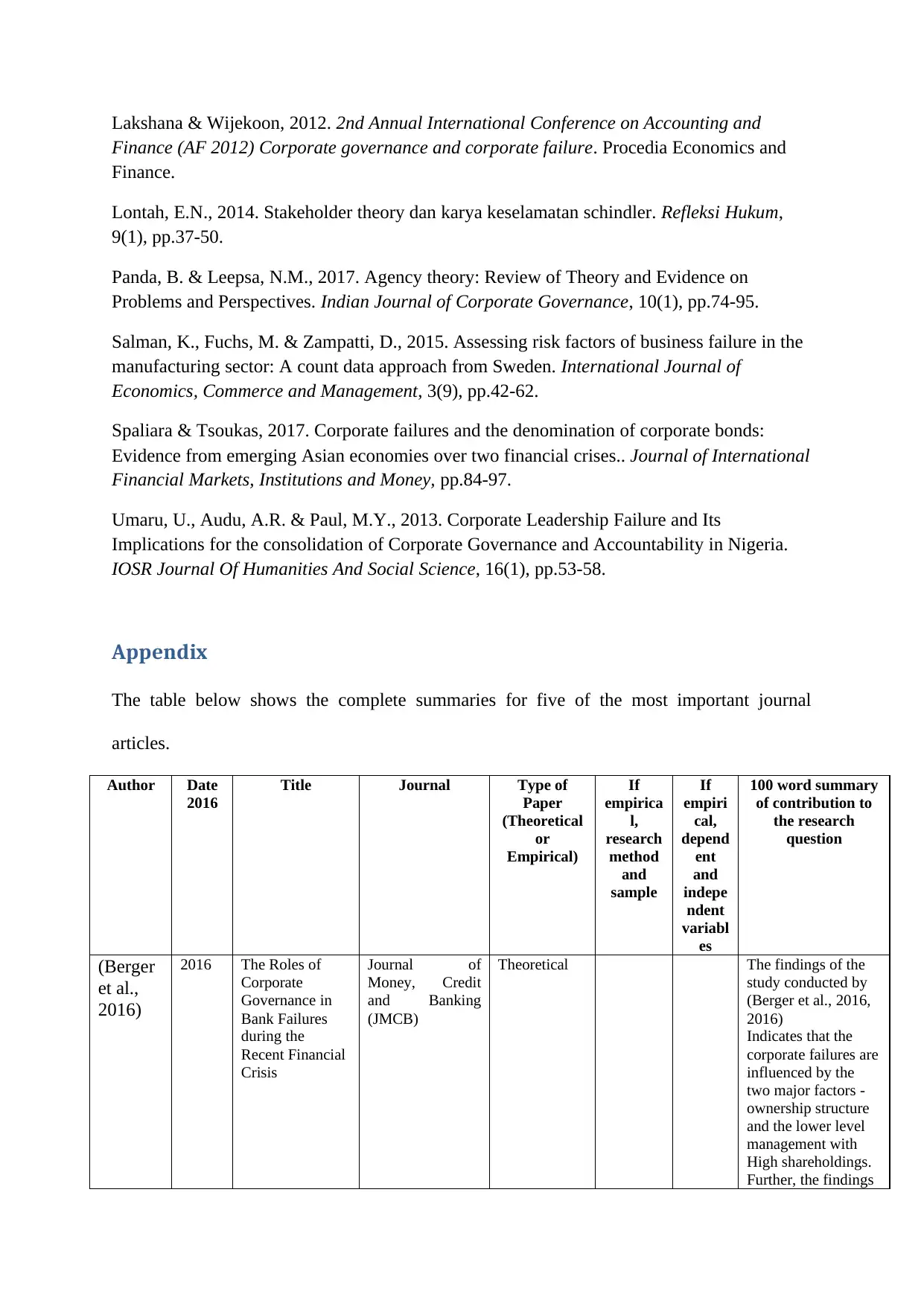
Lakshana & Wijekoon, 2012. 2nd Annual International Conference on Accounting and
Finance (AF 2012) Corporate governance and corporate failure. Procedia Economics and
Finance.
Lontah, E.N., 2014. Stakeholder theory dan karya keselamatan schindler. Refleksi Hukum,
9(1), pp.37-50.
Panda, B. & Leepsa, N.M., 2017. Agency theory: Review of Theory and Evidence on
Problems and Perspectives. Indian Journal of Corporate Governance, 10(1), pp.74-95.
Salman, K., Fuchs, M. & Zampatti, D., 2015. Assessing risk factors of business failure in the
manufacturing sector: A count data approach from Sweden. International Journal of
Economics, Commerce and Management, 3(9), pp.42-62.
Spaliara & Tsoukas, 2017. Corporate failures and the denomination of corporate bonds:
Evidence from emerging Asian economies over two financial crises.. Journal of International
Financial Markets, Institutions and Money, pp.84-97.
Umaru, U., Audu, A.R. & Paul, M.Y., 2013. Corporate Leadership Failure and Its
Implications for the consolidation of Corporate Governance and Accountability in Nigeria.
IOSR Journal Of Humanities And Social Science, 16(1), pp.53-58.
Appendix
The table below shows the complete summaries for five of the most important journal
articles.
Author Date
2016
Title Journal Type of
Paper
(Theoretical
or
Empirical)
If
empirica
l,
research
method
and
sample
If
empiri
cal,
depend
ent
and
indepe
ndent
variabl
es
100 word summary
of contribution to
the research
question
(Berger
et al.,
2016)
2016 The Roles of
Corporate
Governance in
Bank Failures
during the
Recent Financial
Crisis
Journal of
Money, Credit
and Banking
(JMCB)
Theoretical The findings of the
study conducted by
(Berger et al., 2016,
2016)
Indicates that the
corporate failures are
influenced by the
two major factors -
ownership structure
and the lower level
management with
High shareholdings.
Further, the findings
Finance (AF 2012) Corporate governance and corporate failure. Procedia Economics and
Finance.
Lontah, E.N., 2014. Stakeholder theory dan karya keselamatan schindler. Refleksi Hukum,
9(1), pp.37-50.
Panda, B. & Leepsa, N.M., 2017. Agency theory: Review of Theory and Evidence on
Problems and Perspectives. Indian Journal of Corporate Governance, 10(1), pp.74-95.
Salman, K., Fuchs, M. & Zampatti, D., 2015. Assessing risk factors of business failure in the
manufacturing sector: A count data approach from Sweden. International Journal of
Economics, Commerce and Management, 3(9), pp.42-62.
Spaliara & Tsoukas, 2017. Corporate failures and the denomination of corporate bonds:
Evidence from emerging Asian economies over two financial crises.. Journal of International
Financial Markets, Institutions and Money, pp.84-97.
Umaru, U., Audu, A.R. & Paul, M.Y., 2013. Corporate Leadership Failure and Its
Implications for the consolidation of Corporate Governance and Accountability in Nigeria.
IOSR Journal Of Humanities And Social Science, 16(1), pp.53-58.
Appendix
The table below shows the complete summaries for five of the most important journal
articles.
Author Date
2016
Title Journal Type of
Paper
(Theoretical
or
Empirical)
If
empirica
l,
research
method
and
sample
If
empiri
cal,
depend
ent
and
indepe
ndent
variabl
es
100 word summary
of contribution to
the research
question
(Berger
et al.,
2016)
2016 The Roles of
Corporate
Governance in
Bank Failures
during the
Recent Financial
Crisis
Journal of
Money, Credit
and Banking
(JMCB)
Theoretical The findings of the
study conducted by
(Berger et al., 2016,
2016)
Indicates that the
corporate failures are
influenced by the
two major factors -
ownership structure
and the lower level
management with
High shareholdings.
Further, the findings
⊘ This is a preview!⊘
Do you want full access?
Subscribe today to unlock all pages.

Trusted by 1+ million students worldwide
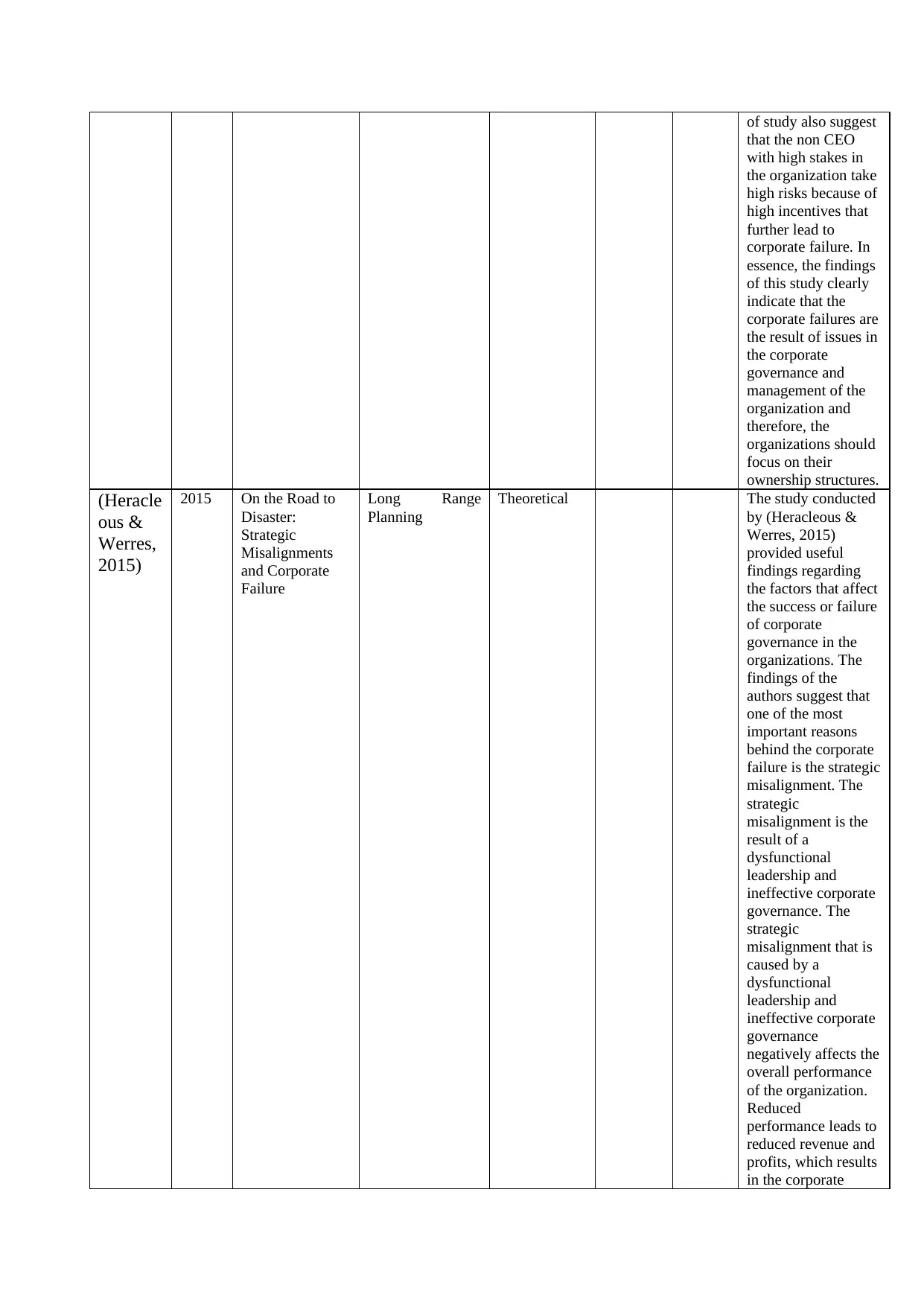
of study also suggest
that the non CEO
with high stakes in
the organization take
high risks because of
high incentives that
further lead to
corporate failure. In
essence, the findings
of this study clearly
indicate that the
corporate failures are
the result of issues in
the corporate
governance and
management of the
organization and
therefore, the
organizations should
focus on their
ownership structures.
(Heracle
ous &
Werres,
2015)
2015 On the Road to
Disaster:
Strategic
Misalignments
and Corporate
Failure
Long Range
Planning
Theoretical The study conducted
by (Heracleous &
Werres, 2015)
provided useful
findings regarding
the factors that affect
the success or failure
of corporate
governance in the
organizations. The
findings of the
authors suggest that
one of the most
important reasons
behind the corporate
failure is the strategic
misalignment. The
strategic
misalignment is the
result of a
dysfunctional
leadership and
ineffective corporate
governance. The
strategic
misalignment that is
caused by a
dysfunctional
leadership and
ineffective corporate
governance
negatively affects the
overall performance
of the organization.
Reduced
performance leads to
reduced revenue and
profits, which results
in the corporate
that the non CEO
with high stakes in
the organization take
high risks because of
high incentives that
further lead to
corporate failure. In
essence, the findings
of this study clearly
indicate that the
corporate failures are
the result of issues in
the corporate
governance and
management of the
organization and
therefore, the
organizations should
focus on their
ownership structures.
(Heracle
ous &
Werres,
2015)
2015 On the Road to
Disaster:
Strategic
Misalignments
and Corporate
Failure
Long Range
Planning
Theoretical The study conducted
by (Heracleous &
Werres, 2015)
provided useful
findings regarding
the factors that affect
the success or failure
of corporate
governance in the
organizations. The
findings of the
authors suggest that
one of the most
important reasons
behind the corporate
failure is the strategic
misalignment. The
strategic
misalignment is the
result of a
dysfunctional
leadership and
ineffective corporate
governance. The
strategic
misalignment that is
caused by a
dysfunctional
leadership and
ineffective corporate
governance
negatively affects the
overall performance
of the organization.
Reduced
performance leads to
reduced revenue and
profits, which results
in the corporate
Paraphrase This Document
Need a fresh take? Get an instant paraphrase of this document with our AI Paraphraser
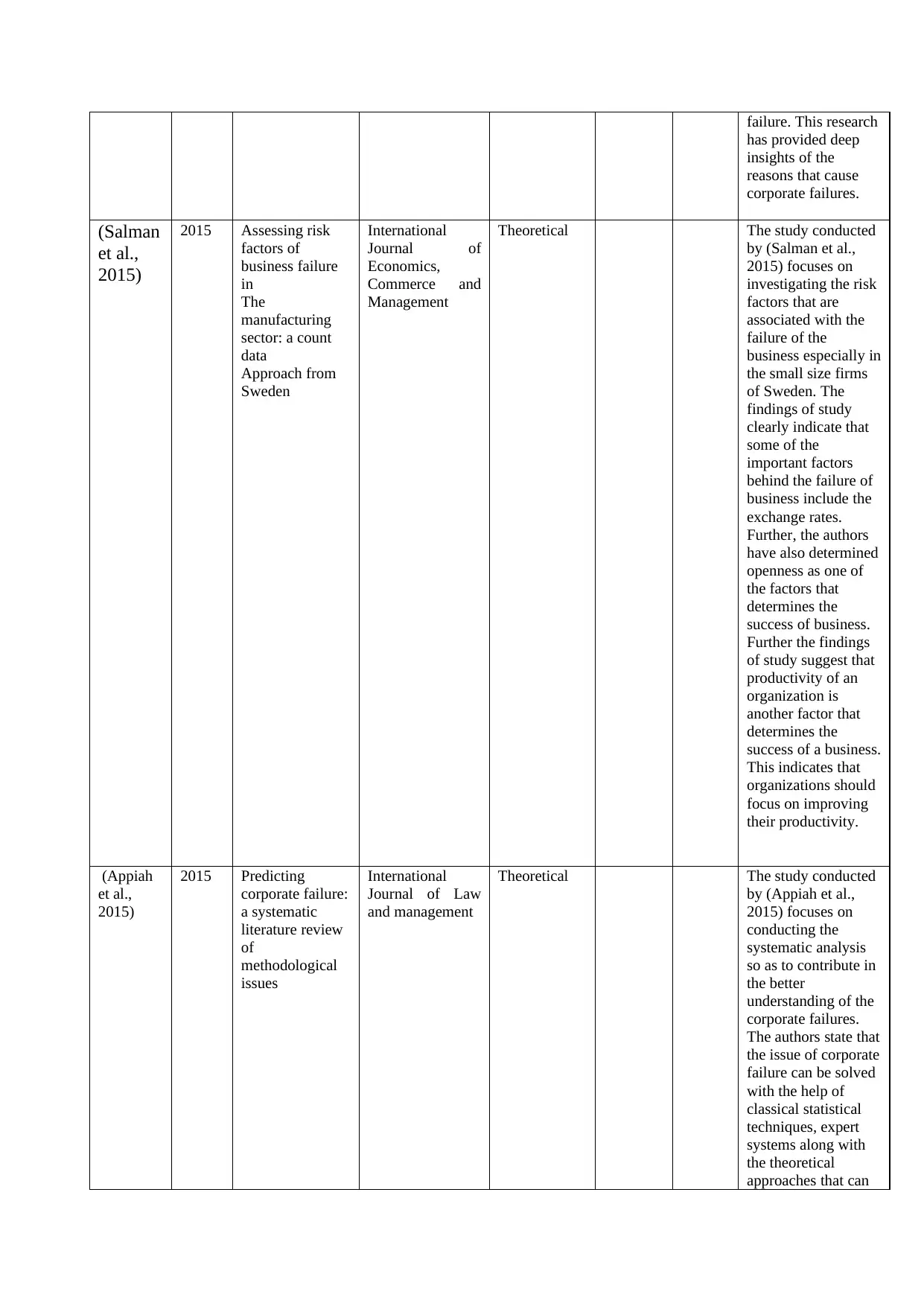
failure. This research
has provided deep
insights of the
reasons that cause
corporate failures.
(Salman
et al.,
2015)
2015 Assessing risk
factors of
business failure
in
The
manufacturing
sector: a count
data
Approach from
Sweden
International
Journal of
Economics,
Commerce and
Management
Theoretical The study conducted
by (Salman et al.,
2015) focuses on
investigating the risk
factors that are
associated with the
failure of the
business especially in
the small size firms
of Sweden. The
findings of study
clearly indicate that
some of the
important factors
behind the failure of
business include the
exchange rates.
Further, the authors
have also determined
openness as one of
the factors that
determines the
success of business.
Further the findings
of study suggest that
productivity of an
organization is
another factor that
determines the
success of a business.
This indicates that
organizations should
focus on improving
their productivity.
(Appiah
et al.,
2015)
2015 Predicting
corporate failure:
a systematic
literature review
of
methodological
issues
International
Journal of Law
and management
Theoretical The study conducted
by (Appiah et al.,
2015) focuses on
conducting the
systematic analysis
so as to contribute in
the better
understanding of the
corporate failures.
The authors state that
the issue of corporate
failure can be solved
with the help of
classical statistical
techniques, expert
systems along with
the theoretical
approaches that can
has provided deep
insights of the
reasons that cause
corporate failures.
(Salman
et al.,
2015)
2015 Assessing risk
factors of
business failure
in
The
manufacturing
sector: a count
data
Approach from
Sweden
International
Journal of
Economics,
Commerce and
Management
Theoretical The study conducted
by (Salman et al.,
2015) focuses on
investigating the risk
factors that are
associated with the
failure of the
business especially in
the small size firms
of Sweden. The
findings of study
clearly indicate that
some of the
important factors
behind the failure of
business include the
exchange rates.
Further, the authors
have also determined
openness as one of
the factors that
determines the
success of business.
Further the findings
of study suggest that
productivity of an
organization is
another factor that
determines the
success of a business.
This indicates that
organizations should
focus on improving
their productivity.
(Appiah
et al.,
2015)
2015 Predicting
corporate failure:
a systematic
literature review
of
methodological
issues
International
Journal of Law
and management
Theoretical The study conducted
by (Appiah et al.,
2015) focuses on
conducting the
systematic analysis
so as to contribute in
the better
understanding of the
corporate failures.
The authors state that
the issue of corporate
failure can be solved
with the help of
classical statistical
techniques, expert
systems along with
the theoretical
approaches that can
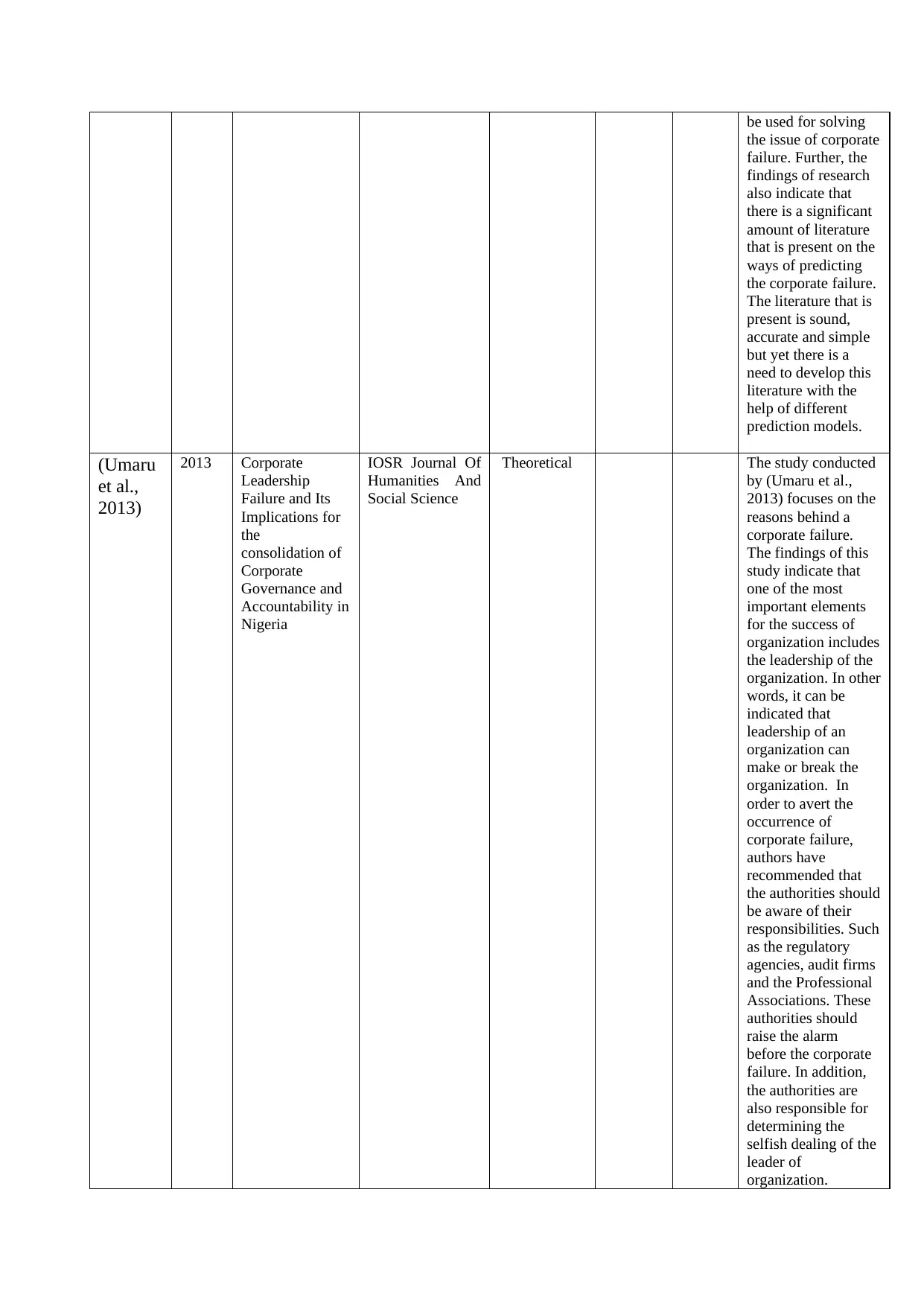
be used for solving
the issue of corporate
failure. Further, the
findings of research
also indicate that
there is a significant
amount of literature
that is present on the
ways of predicting
the corporate failure.
The literature that is
present is sound,
accurate and simple
but yet there is a
need to develop this
literature with the
help of different
prediction models.
(Umaru
et al.,
2013)
2013 Corporate
Leadership
Failure and Its
Implications for
the
consolidation of
Corporate
Governance and
Accountability in
Nigeria
IOSR Journal Of
Humanities And
Social Science
Theoretical The study conducted
by (Umaru et al.,
2013) focuses on the
reasons behind a
corporate failure.
The findings of this
study indicate that
one of the most
important elements
for the success of
organization includes
the leadership of the
organization. In other
words, it can be
indicated that
leadership of an
organization can
make or break the
organization. In
order to avert the
occurrence of
corporate failure,
authors have
recommended that
the authorities should
be aware of their
responsibilities. Such
as the regulatory
agencies, audit firms
and the Professional
Associations. These
authorities should
raise the alarm
before the corporate
failure. In addition,
the authorities are
also responsible for
determining the
selfish dealing of the
leader of
organization.
the issue of corporate
failure. Further, the
findings of research
also indicate that
there is a significant
amount of literature
that is present on the
ways of predicting
the corporate failure.
The literature that is
present is sound,
accurate and simple
but yet there is a
need to develop this
literature with the
help of different
prediction models.
(Umaru
et al.,
2013)
2013 Corporate
Leadership
Failure and Its
Implications for
the
consolidation of
Corporate
Governance and
Accountability in
Nigeria
IOSR Journal Of
Humanities And
Social Science
Theoretical The study conducted
by (Umaru et al.,
2013) focuses on the
reasons behind a
corporate failure.
The findings of this
study indicate that
one of the most
important elements
for the success of
organization includes
the leadership of the
organization. In other
words, it can be
indicated that
leadership of an
organization can
make or break the
organization. In
order to avert the
occurrence of
corporate failure,
authors have
recommended that
the authorities should
be aware of their
responsibilities. Such
as the regulatory
agencies, audit firms
and the Professional
Associations. These
authorities should
raise the alarm
before the corporate
failure. In addition,
the authorities are
also responsible for
determining the
selfish dealing of the
leader of
organization.
⊘ This is a preview!⊘
Do you want full access?
Subscribe today to unlock all pages.

Trusted by 1+ million students worldwide

1 out of 10
Related Documents
Your All-in-One AI-Powered Toolkit for Academic Success.
+13062052269
info@desklib.com
Available 24*7 on WhatsApp / Email
![[object Object]](/_next/static/media/star-bottom.7253800d.svg)
Unlock your academic potential
Copyright © 2020–2025 A2Z Services. All Rights Reserved. Developed and managed by ZUCOL.





